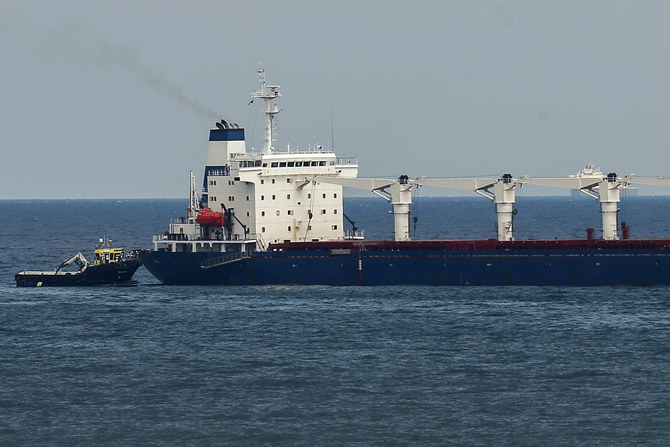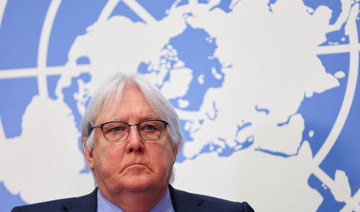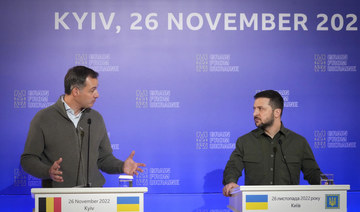DAVOS, Switzerland: Inspections of ships carrying Ukrainian grain and other food exports have slowed to half their peak rate under a UN-brokered wartime agreement, creating backlogs in vessels meant to carry supplies to developing nations where people are going hungry, United Nations and Ukrainian officials say.
Some US and Ukrainian officials accuse Russia of deliberately slowing down inspections, which a Russian official denied.
As the grain initiative got rolling in August, only 4.1 inspections of ships — both heading to and leaving Ukraine — took place each day on average, according to data the Joint Coordination Center in Istanbul provided to The Associated Press. Inspection teams from Russia, Ukraine, the UN and Turkiye ensure ships carry only food and other agricultural products and no weapons.
In September, inspections jumped to 10.4 per day, then a peak rate of 10.6 in October. Since then, it’s been downhill: 7.3 in November, 6.5 in December and 5.3 so far in January.
“The hope had been that going into 2023, you would see every month the daily rate of inspection going up, not that you would see it halved,” USAID Administrator Samantha Power said in an interview Thursday at the World Economic Forum meeting in Davos, Switzerland.
The slowdown in inspections “has a material effect … in terms of the number of ships that can get out,” said the head of the US Agency for International Development. “That, in turn, inevitably has a knock-on effect on global supply.”
More than 100 vessels are waiting in the waters off Turkiye either for inspection or for their applications to participate to clear, with the waiting time of vessels between application and inspection averaging 21 days in the last two weeks, according to the UN
Despite fewer average daily inspections, UN figures showed that more grain actually got through last month, up 3.7 million metric tons from 2.6 million in November. The coordination center explained that that was due to use of larger vessels in December.
Officials fear what comes next. The UN’s deputy spokesman in New York linked the slowdown in inspections to the backlogs in ships, saying the rate needs to pick up but did not pin blame on Russia.
“We, as the UN, are urging all the parties to work to remove obstacles for the reduction of the backlog and improve our efficiencies,” Farhan Haq told journalists Wednesday.
“We’ve have been pushing to get more inspections. We’ve been pushing to make sure that the inspections proceed quickly and thoroughly,” he said. “We’re trying to do everything we can to move it faster.”
The number of inspections of ships to and from Ukraine is a crucial measure of the throughput of Ukrainian grain to world markets, but not the only one: Other factors include port activity, harvest and agricultural supply, silo stockpiles, weather, ship availability and the capacity of vessels.
The Black Sea Grain Initiative was designed to free up Ukrainian wheat, barley and other food critical to nations in Africa, the Middle East and Asia, where shortages of affordable supplies sent food prices surging and helped throw more people into poverty.
Proponents hoped a November extension of the deal would spur an acceleration of inspections — and thus help ship millions of tons of food out of three Ukrainian ports disrupted by Russia’s invasion 11 months ago.
But Power said the US was “very concerned” that Moscow might be deliberately dragging its heels on inspections.
“Costs of actually exporting and shipping are now up 20 percent because you have these crews that are just idling for the extra time it takes because the Russian Federation has cut down on the number of inspections it will participate in,” she said.
“It seems to be a deliberate slow-rolling of the mechanism,” Power added, echoing similar comments that US Ambassador to the UN Linda Thomas-Greenfield gave to the Security Council on Jan. 13. She blamed “Russia’s deliberate slowdown of inspections.”
Asked whether Russia was deliberately slowing the inspections, Alexander Pchelyakov, a spokesman for the Russian diplomatic mission to UN institutions in Geneva, said: “That’s simply not true.”
“The Russian side adheres to the number of daily inspections in accordance to the reached agreements,” he said by text message.
In a Facebook post Thursday, the Ukrainian Ministry of Infrastructure said ship backlogs began in November.
“The average waiting time is from 2 to 5 weeks, which also leads to millions of losses for cargo owners,” the ministry wrote, adding that Russia had “artificially reduced the number of inspection teams from 5 to 3 without any explanation.”
The time needed for inspections was “artificially increased by checking the performance of vessels,” it added, saying there were cases “when Russians refuse to work for fictitious reasons.”
The ministry accused Russia of “purposeful sabotage,” saying that since October, the ports have been forced to work at half-capacity and inflows of ships have declined.
Turkiye’s Defense Ministry didn’t immediately response to emails seeking comment about the inspection slowdowns.
The grain initiative, brokered by the UN and Turkiye, came with a separate arrangement to help Russia export its food and fertilizer as farmers worldwide face soaring prices for the nutrients needed for their crops.
Russia has complained that Western sanctions have created obstacles to its agricultural exports. While sanctions don’t target Russian food or fertilizer, many shipping and insurance companies have been reluctant to deal with Moscow, either refusing to do so or greatly increasing the price.
Overall under the deal, 17.8 million tons of Ukrainian agricultural products have been exported to 43 countries since Aug. 1, the UN said. China — a key ally of Russia — has been a top recipient, followed by Spain and Turkiye.
Low and lower-middle income countries received 44 percent of the wheat exported under the deal, with nearly two-thirds of that going to developing economies, the world body said. The UN’s World Food Program purchased 8 percent of the total.
The organization says nearly 350 million people worldwide are on the brink of starvation because of conflict, climate change and COVID-19, a rise of 200 million people from before the pandemic.
“I don’t care if you love or hate Russia, you got to have the food and the fertilizer,” WFP Executive Director David Beasley told AP at Davos. “If we’re not careful, we will have a shortage of food by the end of this year, or the food price will be so high that you’ll have destabilization of nations that will result in mass migration.”
Inspections of Ukrainian grain ships halved since October
https://arab.news/926mh
Inspections of Ukrainian grain ships halved since October

- Some US and Ukrainian officials accuse Russia of deliberately slowing down inspections, which a Russian official denied
- As the grain initiative got rolling in August, only 4.1 inspections of ships — both heading to and leaving Ukraine — took place each day on average
Over 1 million claims related to toxic exposure granted under new veterans law, Biden announces

- In raw numbers, more than 1 million claims have been granted to veterans since Biden signed the so-called PACT Act into law in August 2022, the administration said Tuesday
NASHUA, N.H.: President Joe Biden, aiming to highlight his legislative accomplishments this election year, traveled to New Hampshire on Tuesday to discuss how he’s helped military veterans get benefits as a result of burn pit or other toxic exposure during their service.
“We can never fully thank you for all the sacrifices you’ve made,” Biden said to the veterans and their families gathered at a YMCA. “In America, we leave no veteran behind. That’s our motto.”
In raw numbers, more than 1 million claims have been granted to veterans since Biden signed the so-called PACT Act into law in August 2022, the administration said Tuesday. That amounts to about 888,000 veterans and survivors in all 50 states who have been able to receive disability benefits under the law.
That totals about $5.7 billion in benefits given to veterans and their survivors, according to the administration.
“The president, I think, has believed now for too long, too many veterans who got sick serving and fighting for our country had to fight the VA for their care, too,” Veterans Affairs Secretary Denis McDonough told reporters on Monday. PACT stands for “Promise to Address Comprehensive Toxics.”
The PACT Act is relatively lower profile compared to the president’s other legislative accomplishments — such as a bipartisan infrastructure law and a sweeping tax, climate and health care package — but it is one that is deeply personal for Biden.
He has blamed burn pits for the brain cancer that killed his son, Beau, who served in Iraq, and has vowed repeatedly that he would get the PACT Act into law. Burn pits are where chemicals, tires, plastics, medical equipment and human waste were disposed of on military bases and were used in Iraq and Afghanistan.
Before the law, the Department of Veterans Affairs denied 70 percent of disability claims that involved burn pit exposure. Now, the law requires the VA to assume that certain respiratory illnesses and cancers were related to burn pit or other toxic exposure without veterans having to prove the link.
Before Biden’s planned remarks, he went to a Veterans of Foreign Wars post in Merrimack, New Hampshire. The president met there with Lisa Clark, an Air Force veteran who is receiving benefits through the PACT Act because her late husband, Senior Master Sergeant Carl Clark, was exposed to the chemical herbicide Agent Orange during the Vietnam War.
Sen. Jon Tester, D-Montana, marked the milestone by praising the veterans who advocated for the law.
“For far too long, our nation failed to honor its promises to our veterans exposed to toxins in military conflicts across the globe— until we fought like hell alongside veterans to finally get the PACT Act signed into law,” Tester, chairman of the Senate Veterans’ Affairs Committee, said.
Blinken says he’ll work with US Congress to respond to ICC move on Gaza

- The United States is not a member of the court, but has supported past prosecutions, including the ICC’s decision last year to issue an arrest warrant for Russian President Vladimir Putin over the war in Ukraine
WASHINGTON: The Biden administration is willing to work with Congress to respond to the International Criminal Court prosecutor’s request for arrest warrants for Israeli leaders over the Gaza war, Secretary of State Antony Blinken said on Tuesday, amid Republican calls for US sanctions against court officials.
Speaking at a Senate Foreign Relations Committee hearing, Blinken called the move “profoundly wrong-headed” and said it would complicate the prospects of reaching a hostage deal and a ceasefire in Israel’s conflict with the Palestinian militant group Hamas.
ICC prosecutor Karim Khan said on Monday he had reasonable grounds to believe that Israeli Prime Minister Benjamin Netanyahu, Israel’s defense chief and three Hamas leaders “bear criminal responsibility” for alleged war crimes and crimes against humanity.
Both President Joe Biden, a Democrat, and his political opponents have sharply criticized Khan’s announcement, arguing the court does not have jurisdiction over the Gaza conflict and raising concerns over process.
The United States is not a member of the court, but has supported past prosecutions, including the ICC’s decision last year to issue an arrest warrant for Russian President Vladimir Putin over the war in Ukraine.
“We’ll be happy to work with Congress, with this committee, on an appropriate response” to the ICC move, Blinken said on Tuesday.
He did not say what a response to the ICC move might include.
In a later hearing, Republican Senator Lindsey Graham told Blinken he hoped to work together with the administration to express the United States’ opposition to the ICC prosecutor.
“What I hope to happen is that we level sanctions against the ICC for this outrage, to not only help our friends in Israel but protect ourself over time,” said Graham.
Republican members of Congress have previously threatened legislation to impose sanctions on the ICC, but a measure cannot become law without support from President Joe Biden and his fellow Democrats, who control the Senate.
In 2020, then-President Donald Trump’s administration accused the ICC of infringing on US national sovereignty when it authorized an investigation into war crimes committed in Afghanistan. The US targeted court staff, including then-prosecutor Fatou Bensouda, with asset freezes and travel bans.
UK minister accused of ‘witch hunt’ against pro-Palestine movement

- Michael Gove: University encampments represent ‘antisemitism repurposed for Instagram age’
- Palestine Solidarity Campaign: Britain ‘complicit’ in ‘genocide in Gaza’
LONDON: The UK’s secretary of state for leveling up, housing and communities has been accused of conducting a “witch hunt” after accusing pro-Palestinian demonstrators of antisemitism.
Political parties and the Palestine Solidarity Campaign condemned Michael Gove, with the Revolutionary Communist Party calling his accusations an attempt to distract from the Conservatives’ “support for genocide” in Gaza.
The Socialist Workers Party said he is conducting a “witch hunt (against) the Palestine solidarity movement.”
Gove announced plans to make protest organizers foot the cost of policing at pro-Palestinian demonstrations, saying they are not doing enough to stop some attendees spreading anti-Jewish messages.
“Many of those on these marches are thoughtful, gentle, compassionate people — driven by a desire for peace and an end to suffering. But they are side by side with those who are promoting hate,” he added.
“The organizers of these marches could do everything in their power to stop that. They don’t.”
Gove also said pro-Palestinian university encampments across the UK represent “antisemitism repurposed for the Instagram age,” and their presence has facilitated hostility against Jewish students on campuses.
Ben Jamal, PSC director, said in a statement: “Apologists for Israel’s genocidal violence and system of apartheid have lost the democratic and legal arguments, but continue to attempt to delegitimize Palestinian solidarity. They will not succeed.
“At a moment when Israel is on trial in the world’s highest court for the crime of genocide and the day after its Prime Minister has been threatened with ICC (International Criminal Court) arrest warrants for war crimes, it is grotesque that these smears continue.
“The real issues are that the UK government continues to arm Israel, refuses to resume funding to UNRWA (the UN Relief and Works Agency for Palestine Refugees), and is attempting to protect Israel from legal accountability.
“Far from stopping the genocide in Gaza as required under international law, the UK is complicit.”
NGOs seek climate trial of French oil giant TotalEnergies

- The complaint was filed at Paris judicial court days before TotalEnergies holds annual shareholders meeting
- The offenses carry prison sentences ranging between one year to five years and fines of as much as $163,000
PARIS: NGOs filed a criminal complaint against French oil giant TotalEnergies and its top shareholders in Paris on Tuesday, seeking a trial for involuntary manslaughter and other consequences of climate change “chaos.”
The case targets the company’s board, including chief executive Patrick Pouyanne, and major shareholders that backed its climate strategy, including US investment firm BlackRock and Norway’s central bank, Norges Bank.
In a statement, the three NGOs and eight individuals said they accused the group of “deliberately endangering the lives of others, involuntary manslaughter, neglecting to address a disaster, and damaging biodiversity.”
The complaint was filed at the Paris judicial court, which has environmental and health departments, three days before TotalEnergies holds its annual shareholders meeting.
The prosecutor now has three months to decide whether to open a judicial investigation, the NGOs said. If it does not go ahead, the plaintiffs can take their case directly before an investigative judge.
The offenses carry prison sentences ranging between one year to five years and fines of as much as 150,000 euros ($163,000).
“This legal action could set a precedent in the history of climate litigation as it opens the way to holding fossil fuel producers and shareholders responsible before criminal courts for the chaos caused by climate change,” the NGOs said.
The plaintiffs include “victims or survivors of climate-related disasters” in Australia, Belgium, France, Greece, Pakistan, the Philippines and Zimbabwe.
TotalEnergies did not immediately return a request for comment.
Oil and gas companies, other corporations and governments are facing a growing number of legal cases related to the climate crisis worldwide.
TotalEnergies is facing other legal cases in France related to climate change.
Outside the Paris judicial court, the NGOs held a banner reading “climate change kills” and “let’s put shareholders behind bars” — with the “share” in shareholders crossed out and replaced by the “death.”
The latest complaint aims to “recognize the deadly consequences of their decisions, their stubbornness in voting for fossil projects which threaten the stability of the climate and therefore of all living things,” Claire Nouvian, founding director of conservation group Bloom, said at a news conference.
Fossil fuels — oil, gas and coal — are the biggest contributors to heat-trapping greenhouse gas emissions.
One of the plaintiffs in the Paris case is Benjamin Van Bunderen Robberechts, a 17-year-old Belgian whose friend Rosa died in flash floods in Belgium at the age of 15 in 2021.
In Paris to file the complaint, he said he had come to “demand justice” against those “who choose profit over human lives and climate.”
In their statement, the plaintiffs said “TotalEnergies has known the direct link between its activities and climate change” since at least 1971.
“TotalEnergies followed a climate skeptic line in order to waste time, delay decision-making and protect its increasing investments in fossil fuels,” they added.
They said they hope to set a legal precedent “whereby opening new fossil fuel projects would be considered criminal.”
While the case was filed on Tuesday, TotalEnergies announced a deepwater project off the coast of Angola, with production set to start in 2028 to extract 70,000 barrels per day.
Gunmen kill around 40 people in attack in northcentral Nigeria: official

- Armed men invaded Zurak community, shooting sporadically and torching houses
- Local youth leader Shafi’i Sambo also said at least 42 people had been killed in the raid
LAGOS: Gunmen riding motorbikes killed around 40 people in a raid on a mining community in northcentral Nigeria, opening fire on residents and torching homes, the local government said on Tuesday.
The attack late on Monday on Wase district in Plateau state was the latest violence in an area which has long been a flashpoint for disputes over resources and for outbreaks of intercommunal clashes.
Armed men invaded Zurak community, shooting sporadically and torching houses, Plateau state commissioner for information Musa Ibrahim Ashoms told AFP by telephone.
“As we speak, about 40 people have been confirmed dead. Zurak is a popular mining community,” he said.
Local youth leader Shafi’i Sambo also said at least 42 people had been killed in the raid.
Wase has deposits of zinc and lead, while Plateau as a whole is known for its tin mining industry.
Sitting on the dividing line between Nigeria’s mostly Muslim north and predominantly Christian south, Plateau often sees outbreaks of violence sparked by disputes between nomadic herders and pastoral farmers.
Climate change has also helped escalate tensions over grazing land, water access and other resources such as the state’s metal reserves.
Parts of northwest and northcentral Nigeria have also been terrorized by heavily armed criminal gangs, who raid villages to loot and carry out mass kidnappings for ransom.
In January, intercommunal clashes erupted in Plateau’s Mangu town that left churches and mosques burned, more than 50 people dead and thousands displaced.




















